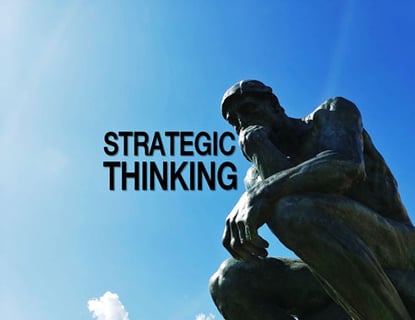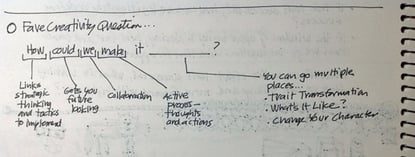My dad was a huge believer in The Power of Positive Thinking. I think that book, by Norman Vincent Peale (affiliate link) was the first self-help book he tried to get me to read.
For some reason, I particularly resisted The Power of Positive Thinking, although I'm hard pressed to say why.
For whatever reason, though, I do not think I ever read the book in its entirety. Probably the best I did was reading a summarized booklet he gave me. The more important aspect of my exposure was absorbing how my dad lived the book's central messages in his work and personal life.
This recollection surfaced while searching for ways to think strategically and positively about several possible business challenges. It’s my tendency to focus on the scary possibilities looming over the horizon and address those.
The Power of Positive Thinking Plus Strategic Thinking Questions
As an alternative, I tried being more like my dad, coupling the power of his positive thinking with the strategic thinking questions that are so comfortable for me. It became apparent how I could more easily form and hold onto a positive expectation when strategic thinking questions provide a way to generate ideas and evidence for the positive thinking. Here are a few examples of positive expectations I wrote, along with the strategic thinking questions to support them:
Positive Expectation - There are people who want to help us succeed.
- Who do we know that shares our interests?
- How can we get them to cooperate with us?
Positive Expectation - We are over-delivering value and benefits.
- If we deliver less value than we planned (but still more than is expected), how can we re-deploy what remains to create additional or different value?
- In what ways can we ask more for this extra portion of value?
Positive Expectation - We have done solid, comprehensive work, and can continue to mine it in new ways.
- What have we done previously that answers a question or issue from today?
- How can what we know or have done previously allow us to move 3x more quickly than if we didn't have previous experience?
Positive Expectation – Remain confident things will work out successfully.
- When this works, what do we need to be ready to do next?
- What next bigger challenge will this success propel us to accomplish?
I’m not saying these specific examples will work for you. What is worth considering is how you can pair up strategic thinking questions to better realize, hold on to, and work toward positive expectations, even if that isn’t your natural tendency. – Mike Brown





